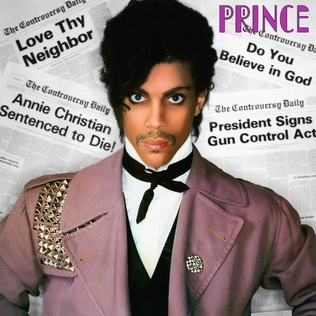
Controversy is the fourth studio album by the American singer-songwriter and musician Prince, released on October 14, 1981, by Warner Bros. Records. It was produced by Prince, written by him, and he also performed most of the instruments on its recording.
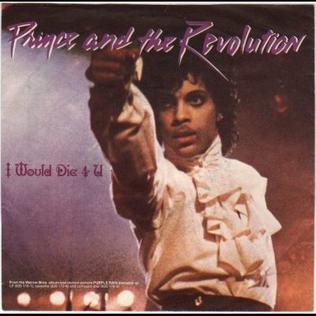
"I Would Die 4 U" is a song by Prince and the Revolution, the fourth single in the US from their 1984 album, Purple Rain. The up-tempo dance song was a top 10 hit—the final one from the album—in the US, reaching number 8 on the Billboard Hot 100.
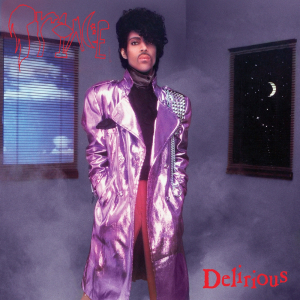
"Delirious" is a song by American musician Prince, from his fifth studio album album, 1999 (1982). It was the album's third single, and Prince's second Top 10 hit, reaching No. 8 in the US during the fall of 1983. The success of the single was boosted by the runaway success of the previous single, "Little Red Corvette", and also because DJs often played the first three album tracks in sequence, which just happened to be the order of the singles released from the album.

"Controversy" is a song by American musician Prince, the lead single and title track to his 1981 album. The song addresses speculation about Prince at the time such as his sexuality, gender, religion, and racial background, and how he could not understand the curiosity surrounding him.

"Pop Life" is a song by Prince and the Revolution. It was the second US single from their 1985 album, Around the World in a Day, reaching number 7 in the US charts, becoming Prince's eighth top-ten hit in a two-year span.
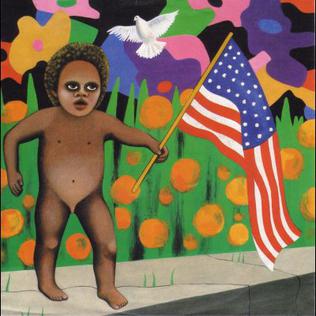
"America" is a song by Prince and The Revolution. It was the final US single from the group's 1985 album, Around the World in a Day.

"New Power Generation", or "N.P.G.", is a song by American musician Prince from the 1990 album and film Graffiti Bridge. It is an anthem for his backing band, The New Power Generation, who were officially co-credited on his album covers for a time, and continued to back him up until 2013, albeit with a changing lineup. The song saw minimal chart attention, and was not as successful as its predecessor, "Thieves in the Temple".

"Let's Pretend We're Married" is a song by American musician Prince from his 1982 album 1999. It was the final US single from the album and peaked at number 52 in the US.

"Uptown" is the lead single from Prince's third album, Dirty Mind. Beginning with a lone drum intro, the track explodes into the keyboards of the chorus. The verses feature a more prominent funk guitar. The song breaks down to a more instrumental section toward the end that mainly consists of guitar, bass and drums with an occasional keyboard riff. The minimalist style of the song is representative of most of the Dirty Mind album. The song addresses the Uptown neighborhood of Minneapolis that was the city's hang-out spot for artists.

"Why You Wanna Treat Me So Bad?" is the US follow-up single to Prince's first big hit, "I Wanna Be Your Lover". It is also Prince's first rock and roll-inspired single release. It did not make the top 40 of the Billboard Hot 100 charts, although it did reach #13 on the R&B Singles charts. The lyrics explore a relationship with a cruel lover. The song prominently features guitar and bass, with the keyboard featured in a less prominent role. A highlight of the song is a soaring guitar solo at the end, played by Prince himself.

"Still Waiting" was the third US single from Prince's second album, Prince. It was Prince's first ballad to be released as a single and was mildly popular on the R&B chart, reaching number 65. The ballad speaks from the perspective of a young man who has not yet found love but yearns for it. The track is mainly piano, acoustic guitar and synth-based and was often played live with extended instrumental solos and audience teasing. The song is a more traditional R&B ballad, before Prince established himself with trademark sexual romps like "Do Me, Baby" and "International Lover".
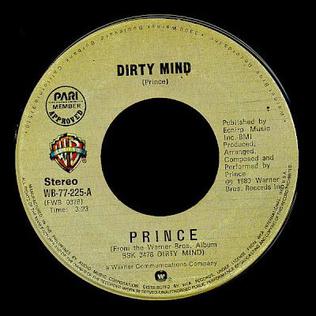
"Dirty Mind" is the follow-up single in the US, and title track to Prince's third album, released in 1980. The song is built around a keyboard riff created by Doctor Fink, which dominates the song. The demo-like song lacks a chorus, and is a stark departure of the smooth R&B sound of Prince's first two albums. The lyrics concern sexual thoughts, which are fairly representative of the other songs from the album. The single's B-side is the ballad "When We're Dancing Close and Slow", from the previous year's Prince. "Dirty Mind" reached number sixty-five on the soul chart. Along with the tracks "Uptown" and "Head", "Dirty Mind" reached number five on the dance chart.

"Do Me, Baby" is a 1981 ballad performed by Prince, from his fourth album, Controversy. Although it was credited as being written by him, it is alleged to have been written by his former bassist and childhood friend André Cymone. It was released as the third and final US single from the album. It was later included on his 1993 compilation The Hits/The B-Sides. In 1986, the song was notably covered by R&B singer Meli'sa Morgan. It was featured in one of the opening scenes of the 2007 film Rush Hour 3, with Chris Tucker's character singing along while listening to it on his headphones and simultaneously directing traffic with the dance sequences of Michael Jackson.
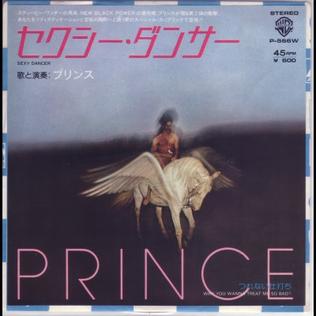
"Sexy Dancer" is a song by Prince, released in the UK as the second single from his self-titled second album. It was the first Prince single released outside the United States that was not released as a single stateside. The disco number has few lyrics but contains prominent bass guitar, grunts and screams. It also has elements of rock and R&B.

"Gotta Stop (Messin' About)" is a song by Prince, released in the UK as a follow-up single to support his third album, Dirty Mind. The single was not an album track, though it was written at the same time, and possessed a similar sound. "Gotta Stop Messin' About" marked the first time Prince released non-album tracks, which, especially as B-sides, would become a prominent part of his career.
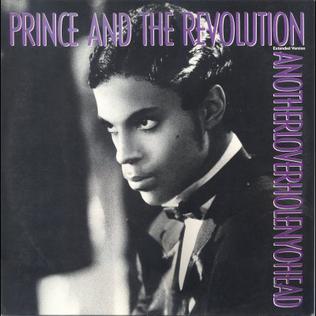
"Anotherloverholenyohead" is a 1986 song by Prince and The Revolution, from the album Parade, the soundtrack to the film Under the Cherry Moon. The song is essentially a solo performance by Prince, with backing vocals from Susannah Melvoin, and the horn section of Eric Leeds and Atlanta Bliss on the extended version. The song also features a string arrangement by Clare Fischer. The song is set in a minor key, and written around a piano chord sequence, although the arrangement emphasizes an upfront guitar synth and a drum machine. The lyrics are about a man trying to reclaim a lover who is intent on leaving him for another. The song's title is a combination of the main idea of the song, and the line "U need another lover like u need a hole in yo head" from the chorus. The single received a 12" extended release with intricate piano work, a horn overdub and some dance commands from Prince.

"Thunder" is a song by American musician Prince and the New Power Generation, from their 1991 album Diamonds and Pearls. It was issued as a limited, individually numbered 12-inch single picture disc in the UK and Ireland only, and the edited version was available only on the promotional single.
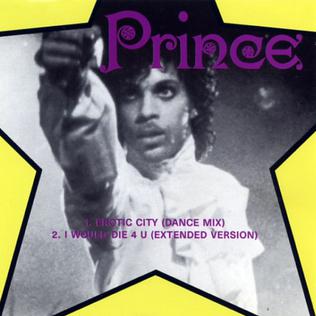
"Erotic City " is a song by the musician Prince. It was released as the B-side to the 1984 single "Let's Go Crazy" and the 12" version of the 1986 single "Girls & Boys". The dance mix of "Erotic City" was released as a 3" and 5" CD single in Germany in 1989 and on June 29, 1990, respectively. The artwork for the single features the same image of Prince that was used for the cover of "I Would Die 4 U". The extended version of the latter was included as the B-side of "Erotic City". The song was released in two versions—the extended remix was released as the B-side to "Let's Go Crazy", while the edit was included on The Hits/The B-Sides.
"Darling Nikki" is a song produced, arranged, composed, and performed by American musician Prince, originally released on his sixth studio album Purple Rain (1984). Though the song was not released as a single, it gained wide notoriety after Tipper Gore pointed out its sexual lyrics—in particular an explicit reference to female masturbation—and was partly responsible for the creation of the infamous Parental Advisory sticker. The song tells the story of a "sex fiend" named Nikki who seduces the singer.
"International Lover" is a song by American musician Prince from the album 1999. It was the song for which he received his first Grammy Award nomination.


















